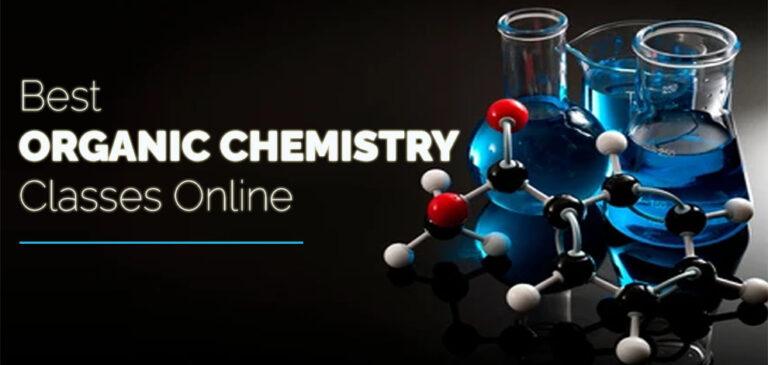Sponsorluk
Where to Find Structured Chemistry Courses Online

Whether you're a high school student preparing for AP Chemistry, a college undergrad tackling general chemistry, or a lifelong learner diving into atomic theory, finding the right structured chemistry course online can make all the difference. With so many resources available, from prestigious universities to independent platforms, it can be overwhelming to decide where to start.
Fortunately, the rise of digital learning platforms has brought chemistry education to our fingertips—making it easier than ever to study subjects like thermodynamics, kinetics, or even enroll in a specialized organic chemistry class online. This article will guide you through the best and most reliable places to find structured chemistry courses on the internet, tailored for learners based in the United States.
Key Points
- Top online platforms offering high-quality structured chemistry courses
- Free vs. paid options and what to expect from each
- How to choose a course based on your academic level (high school, college, or professional)
- Tips for staying engaged and succeeding in online chemistry learning
Why Online Chemistry Courses Matter
Online chemistry courses provide flexibility, accessibility, and the opportunity to learn at your own pace. Whether you're supplementing in-person education or going fully remote, these courses often include interactive content, lab simulations, quizzes, and community discussion forums to enhance your learning experience.
Catering to Different Learning Goals
Structured chemistry courses online are not one-size-fits-all. Depending on your goals, you might seek:
- High School-level courses: Reviewing fundamentals or preparing for AP exams
- College-level modules: Completing general education requirements or major prerequisites
- Specialized tracks: Courses like organic, inorganic, or physical chemistry tailored for pre-med or engineering students
Top Platforms Offering Structured Chemistry Courses
1. Coursera
Coursera partners with accredited universities and offers a wide selection of chemistry courses ranging from beginner to advanced levels. You’ll find courses from institutions like the University of Manchester and Duke University, with some offering full specializations or even credit-eligible certificates.
- Highlights: University-affiliated, flexible deadlines, financial aid available
- Popular Course: “Chemistry” by the University of Kentucky
2. edX
edX is another academic-oriented platform offering courses from Harvard, MIT, and other major universities. You can audit courses for free or pay for verified certificates. Topics range widely, including general, organic, and analytical chemistry.
- Highlights: High academic quality, self-paced options, recognized certificates
- Popular Course: “Principles of Biochemistry” by Harvard University
3. Khan Academy
For younger students or learners new to chemistry, Khan Academy offers completely free, comprehensive lessons. The platform uses short video lectures, interactive quizzes, and practice exercises to help reinforce learning.
- Highlights: Free to use, well-structured for beginners, user-friendly interface
- Good for: High school students and those learning chemistry for the first time
4. The Organic Chemistry Tutor (YouTube)
This YouTube channel has become a staple for students across the U.S. seeking simple, straightforward explanations. Although not as structured as formal courses, it can serve as a great supplement.
- Highlights: Free, high-quality visuals, covers a wide range of chemistry topics
- Limitations: Lacks course progression or assignments
5. The Orango Platform
If you're specifically looking for a structured organic chemistry class online, The Orango Platform offers curated modules that dive deep into organic chemistry with guided lessons, practice problems, and lab simulations tailored to modern learners. It’s a solid option for pre-med students or anyone needing a focused approach to this notoriously difficult subject.
- Highlights: Focused subject matter, designed for serious learners, practice-based learning
- Best for: College students and professionals needing organic chemistry mastery
6. Udemy
Udemy offers affordable courses taught by individual instructors. While the quality can vary, many courses come with lifetime access and a 30-day refund policy. It’s a great option for learners interested in specific topics or needing a refresher.
- Highlights: Low-cost, self-paced, video-heavy content
- Popular Course: “Chemistry 101 – Part 1” by Science Academy
Free vs. Paid Chemistry Courses
One of the most common questions students have is whether to go for free or paid options. Here’s a quick breakdown to help you decide:
Free Courses
- Great for self-learners and budget-conscious students
- Often lack certification or formal assessments
- May not offer instructor support or assignment feedback
Paid Courses
- Include structured learning paths, assignments, and sometimes lab simulations
- Offer certificates, which can help with college applications or resumes
- Greater likelihood of live support and interaction
How to Choose the Right Online Chemistry Course
Before enrolling, ask yourself the following:
- What’s your current level of chemistry knowledge? Beginners should avoid jumping into advanced organic chemistry without foundational knowledge.
- Are you learning for school credit, career advancement, or personal interest? Your goal will define the kind of course you need.
- Do you learn best through videos, readings, or hands-on simulations? Choose a platform that aligns with your learning style.
Tips for Success in Online Chemistry Learning
- Create a dedicated study schedule: Treat it like a real class with set hours.
- Use supplemental materials: Textbooks, YouTube videos, and flashcards can reinforce learning.
- Practice regularly: Chemistry is problem-based. The more you practice, the better you understand.
- Join online study groups or forums: Platforms like Reddit or Discord have communities centered around chemistry learning.
FAQ
Q: Are online chemistry courses as credible as in-person ones?
A: Many online chemistry courses from platforms like edX and Coursera are taught by accredited universities and may even offer transferable credits. Make sure to verify the institution and course credentials before enrolling.
Q: Can I do lab work in an online chemistry course?
A: Some courses incorporate virtual labs or simulations. Others may require at-home experiments with mailed kits. Platforms like The Orango and certain Coursera courses offer enhanced lab components.
Q: How long does it take to complete a chemistry course online?
A: It depends on the course. Introductory courses may last 4–6 weeks, while college-level modules could extend up to 12 weeks or more. Self-paced learning offers flexibility to go faster or slower.
Q: Is it hard to learn chemistry online?
A: Chemistry can be challenging, but online platforms offer tools to make learning manageable—like quizzes, videos, and practice problems. Commitment and routine practice are key.
Q: Are there online chemistry courses suitable for kids or homeschoolers?
A: Yes, platforms like Khan Academy and CK-12 are great for K-12 students. They offer engaging videos, interactive questions, and beginner-friendly explanations.
Q: Can I get college credit from online chemistry courses?
A: Some platforms, such as Coursera and edX, offer credit-eligible courses through participating universities. Always check the course details and consult your academic advisor if you plan to transfer credits






